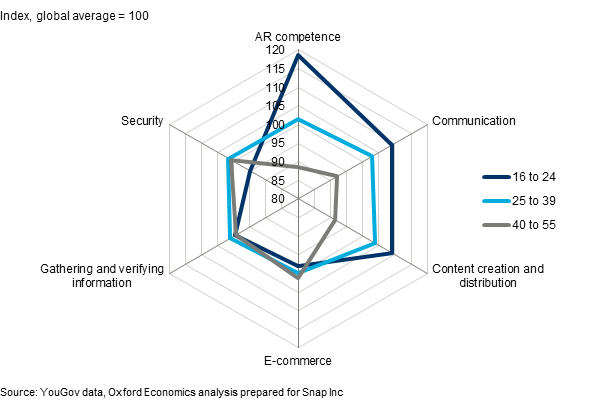Blog | 21 Feb 2023
As Gen Z enters the workforce, society must learn to harness its distinct skills

Morgan Rooney
Economist, Economic Impact

As the world population approaches 8 billion, over a quarter belong to Generation Z (those born between 1997 and 2012). Whilst their impact to both the economy and society is currently limited by their youth, this massive cohort is now joining the workforce. Their distinct priorities, skills, and characteristics will pose a challenge to companies—both as employees and consumers.
As our report with Snap Inc based on data from a group of OECD countries shows, this new generation’s impact will only become more pronounced. By 2030, they will:
- make up almost one-third of the workforce;
- see their disposable incomes increase almost sevenfold; and
- increase their consumer spending more than sixfold.
A defining priority of Gen Z is their commitment to sustainability, being often recognised as the generation most conscious of the issue. Research shows a third of Gen Zers in the US had taken at least one of four actions in 2020-21: donating money, contacting an elected official, volunteering, or attending a rally to help address climate change in the past year—more than any other generation.
Gen Zers are also demanding similar behavioural changes from their employers, as well as the firms supplying their purchases. As consumers, they are willing to spend 10% more on sustainable products—three quarters of the generation state that sustainability is more important to them than brand names. As workers, they want to work for—and will remain longer with—authentically sustainable employers. According to a Deloitte study, 77% of Gen Z respondents said it was important to work at organisations whose values aligned with theirs, and 59% of 18–22-year-olds surveyed by Bupa stated they would remain longer with responsible employers.
However, Gen Zers aren’t just placing these demands on others—they have unique skills that make them ideally placed to push meaningful progress towards the issue themselves. Our research shows a characteristic Gen Zer is more:
- agile—with an enhanced ability to absorb information and react to new challenges;
- creative—particularly with digital; and
- curious—making them particularly open to engaging in various forms of learning.
Having typically grown up with technology their entire lives, Gen Zers are the first wholly digitally native generation.

Digital competence score by age cohort: global sample
These characteristics put them in a strong position to make the most of the opportunities associated with the so-called Green Economy and effectively implement the UN’s Action Plan for a Sustainable Planet in the Digital Age—particularly to “harness the power of digital innovation in mitigating environmental degradation.” There is already evidence of the generation using its unique skills to this end: #FridaysForFuture is a youth-led organised global strike movement inspired by perhaps the most famous Gen Z activist, Greta Thunberg, which now involves over 14 million people across 7,500 cities.
Businesses need to recognise the changing demands of those who will work for them and serve as their customers. As our joint report with Arup showed, those that adapt now and invest in the Green Economy could benefit from significant first-mover advantages by capturing larger shares of these markets. Indeed, the report showed that these opportunities are huge: The transition to net zero emissions is estimated to be worth $10.3 trillion to the global economy by 2050.
Author

Morgan Rooney
Economist, Economic Impact
+44 (0) 20 3910 8163

Morgan Rooney
Economist, Economic Impact
London, United Kingdom
Morgan works as an Economist, having also previously worked as a Research Assistant, both for the Economic Impact Consulting team. During this time, she has worked on projects ranging from the economic impact of the aviation industry worldwide to the economic impact of BP in the UK.
She also worked as an Analyst in the field of competition economics at Compass Lexecon, specialising in cartel damages, and in the finance department of Hitachi Vantara. She holds a First-Class BSc (Hons) and MPhil in Economics from the University of Surrey and the University of Cambridge respectively.
Tags:
You may be interested in

Post
The economic impact of abandoning the WTO
Oxford Economics have been commissioned by the International Chamber of Commerce (ICC) to provide an independent assessment of the economic impact of WTO dissolution. This report details our findings and the assumptions underpinning our analysis.
Find Out More
Post
Global Trade Education: The role of private philanthropy
Global trade can amplify economic development and poverty alleviation. Capable leaders are required to put in place enabling conditions for trade, but currently these skills are underprovided in developing countries. For philanthropists, investing in trade leadership talent through graduate-level scholarships is an opportunity to make meaningful contributions that can multiply and sustain global economic development.
Find Out More
Post
Mapping the Plastics Value Chain: A framework to understand the socio-economic impacts of a production cap on virgin plastics
The International Council of Chemical Associations (ICCA) commissioned Oxford Economics to undertake a research program to explore the socio-economic and environmental implications of policy interventions that could be used to reduce plastic pollution, with a focus on a global production cap on primary plastic polymers.
Find Out More